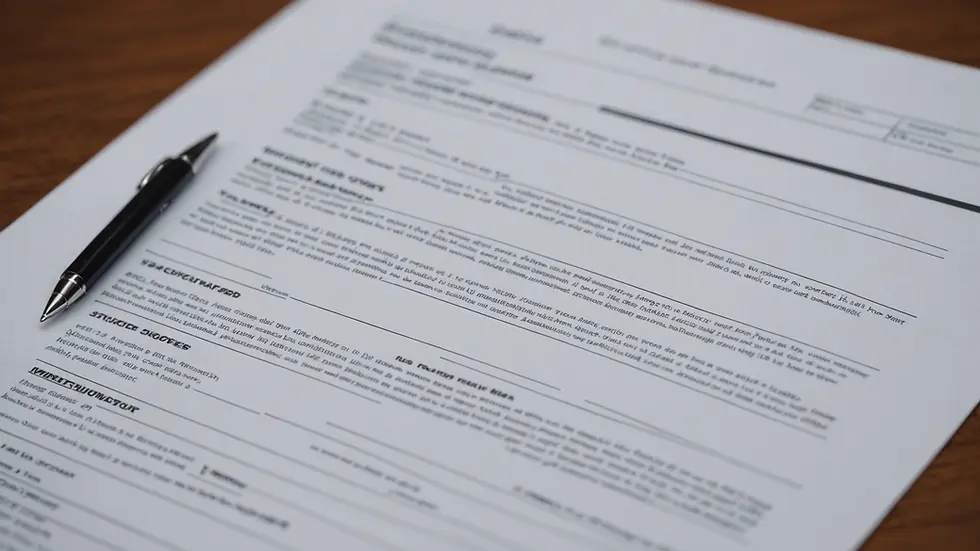MCA Services
- James Antony
- Dec 28, 2024
- 6 min read
Updated: Jul 29
In the fast-paced world of business, staying compliant with regulations from the Ministry of Corporate Affairs (MCA) is essential for maintaining a strong reputation and avoiding penalties. This post will guide you through the various MCA services available in Chennai. It covers the critical compliance requirements for companies, Limited Liability Partnerships (LLPs), and One Person Companies (OPCs).
Understanding Company Compliance
Company compliance includes multiple regulations and statutory requirements that businesses must follow to operate legally. This consists of maintaining accurate records, filing annual returns, and ensuring financial statements meet the required standards.
By adhering to these regulations, businesses protect themselves from legal issues while boosting their market credibility. For example, companies not filing their annual returns on time may incur penalties up to ₹1,00,000, depending on the delay. Keeping updated with new regulations from the MCA is a must for effective compliance management.
LLP Compliance Requirements
Limited Liability Partnerships (LLPs) blend aspects of partnerships and corporations. They face a set of compliance requirements, including:
Filing Annual Returns: LLPs must submit Form 11 each year. This return provides essential information about business activities, partners, and financials.
Statement of Account & Solvency: LLPs are required to submit this statement within 30 days of the financial year's end. This document confirms that the LLP can cover its debts with its assets.
Compliance with these requirements is crucial; failure to submit Form 11 on time could lead to penalties ranging from ₹100 to ₹1,00,000.
OPC Compliance Essentials
One Person Companies (OPCs) allow a single-owner structure while offering limited liability protection. The key compliance aspects for OPCs include:
Annual Filing: Like other corporate entities, OPCs must file their annual return (Form MGT-7) and financial statements.
Appointment of a Nominee: An OPC must have a nominee for company management in case the owner passes away. This is not just a recommendation; it is a legal requirement.
Adhering to Capital Regulations: OPCs should ensure their paid-up capital does not exceed ₹50 lakh, in accordance with the Companies Act.
Name Change - Company
Changing a company's name is often due to rebranding or operational shifts. The process includes:
Board Resolution: The name change requires a board resolution for approval.
Application: Following board approval, file Form INC-1 with the MCA.
Check Name Availability: Before choosing a new name, ensure it is not already taken. Only about 20% of name change applications get approved on the first attempt due to this issue.

Registered Office Change
A company’s registered office is vital for legal and communication purposes. When changing this address, a company must:
Pass a Board Resolution: Hold a board meeting to approve the change.
File with MCA: Submit Form INC-22 to register the new address.
Update Statutory Documents: After addressing the change, ensure that all relevant records are updated, and inform stakeholders. This could include notifying clients, suppliers, and financial institutions, which is critical for maintaining seamless operations.
DIN eKYC Filing
The Director Identification Number (DIN) is necessary for anyone who wants to become a director in a company. To keep the DIN active, directors must complete eKYC filing every financial year, which entails:
Verification of Personal Information: This includes providing a photograph, address proof, and identity proof.
Submission: The eKYC must be submitted through the MCA portal by September 30 each year to avoid penalties.
Regular eKYC ensures that the MCA has accurate and verified records of all company directors.
DIN Reactivation
A DIN can become inactive if the eKYC requirement is not fulfilled. To reactivate a DIN:
Complete the Required Forms: Submit the necessary forms to the MCA along with applicable fees.
Ensure Compliance: Check that all outstanding compliance is resolved before reactivation. An inactive DIN can hinder significant company decisions, including appointments and investments.
Director Change
Changing a director involves a structured process that includes:
Board Approval: The appointment or removal needs to be cleared in a board meeting.
Filing Forms: Form DIR-12 must be submitted to the MCA following board approval to officially reflect this change.
Timely updates of director information ensure that the company's records with the MCA remain accurate.
Remove Director
Removing a director may be necessary for strategic adjustments. The procedure follows these steps:
Passing a Resolution: A board resolution must approve the director's removal.
Filing with MCA: After the resolution, file Form DIR-12 with the MCA to document the change.
Transparency is essential, and following the legal procedures maintains trust among stakeholders.
ADT-1 Filing
The ADT-1 form is crucial for appointing an auditor. The filing process involves:
Board Approval: The auditor's appointment must be confirmed through a board resolution.
Timely Filing: File Form ADT-1 within 30 days of the appointment to comply with regulations.
This ensures the company has an auditor to review its financial statements annually, promoting corporate governance.
DPT-3 Filing
DPT-3 pertains to annual filings related to accepting deposits by companies. It must include:
Deposits Reporting: Details of all accepted deposits, along with depositor particulars, must be included.
Compliance Check: Companies need to comply with regulations set under the Companies Act to avoid penalties that can reach up to ₹1 lakh annually.
DPT-3 is essential for maintaining the transparency of corporate finances.
LLP Form 11 Filing
All LLPs must file Form 11 with the MCA each year. This annual return includes:
Partner Information: Details about partners and their individual contributions.
Business Activities Overview: A summary of business operations during the fiscal year.
Failure to timely file Form 11 can lead to fines of up to ₹1 lakh.
Dormant Status Filing
Inactive companies can apply for dormant status to simplify compliance procedures. To file for this status:
Submit the Application: File Form INC-28 along with documents demonstrating inactivity.
Opting for dormant status can significantly reduce the compliance burden without losing the company's legal standing.
MOA Amendment
Amending the Memorandum of Association (MOA) is required for reasons like changes in business goals or office location. The process consists of:
Passing a Special Resolution: Majority approval is typically required for amendments.
Filing with MCA: Submit the changes along with Form MGT-14 to the MCA.
Updating the MOA is vital for ensuring regulatory compliance and reflecting the company's current operations.
AOA Amendment
Similar to the MOA, the Articles of Association (AOA) may need amendments for operational adjustments. The amendment process includes:
Special Resolution Approval: Gather shareholder approval via a special resolution.
File the Changes: Submit the amended AOA with the MCA, utilizing Form MGT-14.
Keeping the AOA updated is essential for accurately representing the company's governance and operational guidelines.
Authorized Capital Increase
When a company expands, increasing authorized capital may be necessary. This process involves:
Board Approval: The increase must be validated by a board resolution.
Submit Proper Forms: File relevant forms, including Form SH-7, with the MCA to notify them of the change.
Failure to accurately represent authorized capital can result in legal complications and hinder business growth.
Share Transfer
Transferring shares among shareholders is common in many businesses. To ensure compliance during this process:
Complete a Share Transfer Form: Proper documentation is necessary to validate the transfer.
Notify the MCA: Report the transfer to the MCA to maintain accurate records, ensuring compliance with company laws.
Efficient documentation guarantees transparency and legality regarding share ownership.
Demat of Shares
Dematerialization converts physical shares into electronic form, enhancing security and ease of trading. The process includes:
Choose Depository Participants: Select a depository participant to start the demat procedure.
File Required Forms: Submit the necessary documentation to the depository to complete the conversion.
This step facilitates seamless trading and compliance with regulations.
Winding Up - LLP
Closing an LLP involves a formal process, which includes:
Board Resolution: The process initiates with board approval for winding up.
Notification to MCA: File the appropriate forms for dissolution with the MCA.
This structured approach ensures all liabilities are addressed before final closure.

Winding Up - Company
Similar to winding up an LLP, a company must follow legal protocols. Key steps include:
Board Resolution: Similarly, initiate with a board resolution for winding up.
Complete Required Filings: After passing the resolution, file the necessary forms with the MCA to conclude the process.
This careful approach ensures that all obligations are met and the company can conclude its operations smoothly.
Staying Compliant for Success
Maintaining compliance with MCA regulations in Chennai is vital for any business's legal and operational integrity. The processes outlined, from ensuring compliance to winding up a company, are essential for effective business management. By understanding these compliance requirements, business owners can focus on growth and innovation, knowing they are meeting all legal standards. Diligently managing these areas enables businesses to thrive in a competitive environment and contributes positively to the economy.





Comments